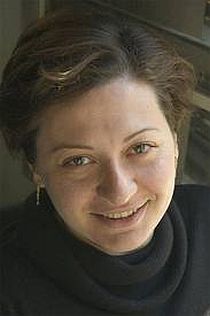


Storydoc Session in Corfu/ 4

With Mediterranean projects in focus it was a natural programme choice to have a session on the situation for documentarians in the countries that have experienced or are experiencing changes that have been named ”revolution” or the ”Arab Uprising” or the ”Arab Spring”.
The organisers had invited Jasminah Metwaly from Egypt and Diana El Jeiroudi (photo, taken by Orwa Nyrabia) from Syria to be the speakers in a session that evoked many interesting comments from the colleagues seated in the auditorium of the Ionian University.
Metwaly showed the three films from the Egyptian revolution that this blog have brought links to previously. They are direct cinema when it is direct, Leacock would have loved it, stating ”yes, it is about being there”, and we were brought to Egypt in the months where it all happened. ”Where is the FILMmaking”, a participant asked having watched the material. This remark brought many viewpoints forward. Some stated that Metwaly used tv language, which she might have done, she said that she did not think about form, when it all broke out, others said that form is not important in this situation, the documentation is what matters. Metwaly brought a project to the workshop, ”Land Without”, that showed another side of her obvious film talent – she had been one day to the countryside filming farmers, who suffer from no water supply, politics, and what she showed was a clip shot in one day with farmers, who are used to be visited by media people and know how to respond to tv news, screaming their despair into the camera, at the same time as they are asking: why are you filming here!? An intelligent film including the filmmaking could come out of this. The filmmaker goes from Corfu back to the farmers.
For Diana El Jeiroudi, who together with her partner Orwa Nyrabia are the couple behind the Dox Box festival in Damascus, the uprising/revolution had been ”cooking” for the last decade – to be manifested/started on March 16. El Jeiroudi, who during the workshop days, together with Nyrabia, reported that two of their staff members had been arrested (they were released again after a couple of days), told the seminar attendants about the tv station al Jazeera being silent for three weeks, about doing filming ”from behind” so the demonstrators can not be recognised if the tapes are confiscated by the authorities, about her asking a documentary maker about the situation right now for filmmaking… the answer was: we make only bad films, we are only documenting. She showed clips from films by Omar Amiralay, and told that the authorities now have approved of the showing of three of his films, until now they have been banned by the regime. Everyone has become a journalist in Syria now, El Jeiroudi said, reporting is done on mobile phones, homemade cameras are being used… but whatever happens, Syria is another country today, said El Jeiroudi, who was also a tutor at the Storydoc session in Corfu.